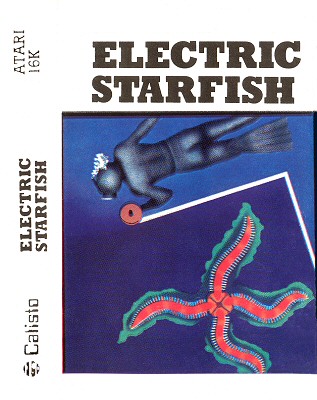 |
ELECTRIC
STARFISH (198?) |
![]()
REVIEW by
AtariGrub
![]()
QIX … there, I've said it! Yes, Electric Starfish is a clone of the 1981 Taito America arcade hit Qix (pronounced 'Kicks'), which was also released in cartridge form on the Atari 8-bit. For those who haven't played the original game, imagine an electronic version of Etch-a-Sketch where you have to draw areas, while avoiding the Qix or in this case the Electric Starfish.
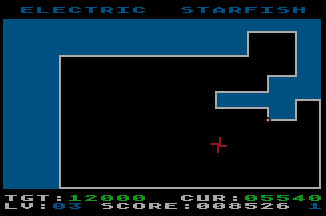 The
unnecessary back-story for this game details your part in a major expansion
project on a distant waterworld called Thule. Your job is to construct fresh
water reservoirs, while avoiding the giant electric starfish. At the start of
each level you will be presented with a large open area containing the electric
starfish, with your cursor starting at the bottom middle of the screen. By holding
down the fire button and moving the joystick you will begin to draw a line,
which must then reach another part of the outer edge of the main area. If the
electric starfish touches you or the line that you are drawing then you'll lose
one of your three lives. When you do manage to touch an outer edge, the area
you've just drawn that does not contain the electric starfish will rapidly fill
with water. Once roughly 75% or more of the screen is filled with water the
next level will begin exactly as before, but now with a slightly faster starfish.
The
unnecessary back-story for this game details your part in a major expansion
project on a distant waterworld called Thule. Your job is to construct fresh
water reservoirs, while avoiding the giant electric starfish. At the start of
each level you will be presented with a large open area containing the electric
starfish, with your cursor starting at the bottom middle of the screen. By holding
down the fire button and moving the joystick you will begin to draw a line,
which must then reach another part of the outer edge of the main area. If the
electric starfish touches you or the line that you are drawing then you'll lose
one of your three lives. When you do manage to touch an outer edge, the area
you've just drawn that does not contain the electric starfish will rapidly fill
with water. Once roughly 75% or more of the screen is filled with water the
next level will begin exactly as before, but now with a slightly faster starfish.
It's hard to review
a clone of a game without comparing it to the original version and unfortunately
in this case it falls flat. Not only are various features that made Qix more
entertaining missing (such as the ability to draw both fast and slow line and
enemy sparks which chase you around the outer areas), but also the percentage
of area filled is replaced in Electric Starfish with a confusing score system.
For those of you who have never played Qix before, this game is an easy introduction
to the original. However, for Qix fans - there can be only one!
 |
"Starfishy"
(4/10) |
![]()
GAME TIPS
Always avoid contact
with the Electric Starfish, which will take one of your lives if it touches
your cursor or the line you're currently drawing. Sometimes you will find that
following the starfish will help you cover more ground quickly.
CLICK HERE to Download an Unlimited Lives file for use in the Atari 800Win Emulator.
![]()
Alternative Covers:
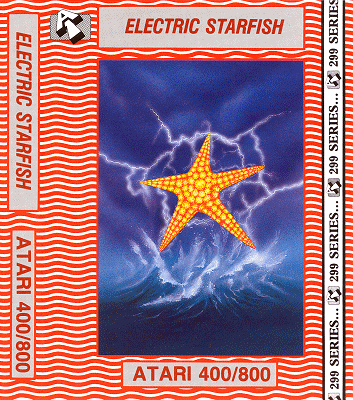 |
|
![]()
Further Information:
Qix, was released in 1981 by Taito America and was described at the time as an arcade Etch-A-Sketch. The idea of the game was to fill in at least 75% of the game board, by drawing lines from the outer edges to create box areas and at the same time avoiding the Qix and Sparx. Using the controls you are able to draw lines fast or slow, with the latter giving you more points. Sequels included Super Qix (1987) and Twin Qix (1995).
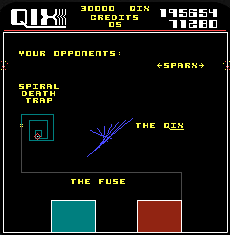
![]()
![]()
![]()
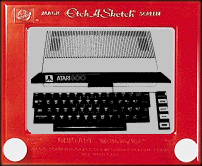
The popular toy Etch-A-Sketch was developed in the late 1950s by Arthur Granjean in France who named it L'Ecran Magique (the magic screen). It was released as Etch-A-Sketch in 1960 and is basically a red plastic frame, holding a glass screen that contains aluminium powder and plastic beads. By turning the knobs at the bottom of the plastic frame a stylus can be controlled which shifts aside the powder, creating black lines. One knob controls vertical movement and the other horizontal. By tipping the Etch-A-Sketch upside down and shaking it, the aluminium is redistributed and any drawn picture is magically erased!
![]()

Seashells.org
(Photos of this undersea animal)
www.seashells.org/identcatagories/starfish.htm
Magic Etch A Sketch
Screen (Elf - The Movie)
(Computer playable Etch A Sketch)
www.elfmovie.com/swf/etchasketch/
How Stuff Works
(Peer inside an Etch A Sketch and find out how it works)
www.howstuffworks.com/question317.htm
The History of
the Etch A Sketch
(Find out the background on this popular toy)
www.etch%2Da%2Dsketch.com/html/history.htm